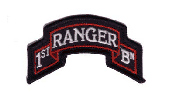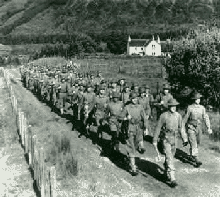1st Battalion

Active from 19 June, 1942 to 15 August, 1944
(per Ranger Memorial Fort Benning, GA)
Rangers found their introduction into the pages of American History with America's entry into World War II. Major General Lucian K. Truscott, U.S. Army, in liaison with the British General Staff, submitted proposals to General George Marshal that "we undertake immediately an American unit along the lines of the British Commandos" in 1942. A cable from the War Department quickly followed to Truscott authorizing the activation of the 1st U.S. Army Ranger Battalion.
After much deliberation, Captain William Orlando Darby, a graduate of West Point with amphibious training, was chosen as the Commanding Officer of the 1st Ranger Battalion. Promoted to major within a few weeks of receiving this assignment, Darby performed the impossible by organizing the unit. Of the 1500 men to volunteer for the original Ranger Battalion, only 600 were chosen and on June 19, 1942 at Sunnylands Camp in Carrickfergus, Northern Ireland, the 1st Ranger Battalion was officially activated.
A select team of four officers toured the existing Commando Training Camps and selected the Center at Achnacarry, Scotland for the Rangers. Here they underwent intensely rugged training. Coached, prodded, and challenged by the battle-seasoned Commando instructors (commanded by Colonel Charles Vaughan), the Rangers learned the rudiments of Commando warfare. Five hundred of the 600 volunteers that Darby brought with him to Achnacarry survived the Commando training, many could not endure the exercises, one Ranger was killed, while several others were wounded in training so realistic, it was actually executed under live fire.
The first Americans to see active combat in the European conflict of WWII were forty-four enlisted men and six officers from the 1st Ranger Battalion. Dispersed among the Canadians and the British Commandos, these men were the first American ground soldiers to see action against the Germans in the famed Dieppe Raid. Three Rangers were killed, several captured, and all won the commendation and esteem of the Commandos in this raid. The first American soldier killed in Europe in WW II was part of the Dieppe Raid, and a Ranger, Lieutenant E.V. Loustalot. During this raid, he took command after the British Captain leading the assault was killed. Loustalot scaled a steep cliff with his men, was wounded three times, but was eventually cut down by enemy crossfire in his attempts to reach the machine-gun nest at the top of the cliff.
The first efforts to stop the German infiltration of Europe was by the 1st Ranger Battalion. In efforts to prevent German occupation of seaports in North Africa, the 1st Ranger Battalion spearheaded an invasion at the Port of Arzew in Algeria. This was accomplished by executing a surprise night landing, silencing two gun batteries, and opening the way for the capture of Oran.
In Tunisia in 1943, the 1st Battalion executed the first Ranger behind-the-lines night raid at Sened Station for the purpose of gaining information and terrorizing the enemy. Later, in March, American units were shot to pieces, time after time, trying to break through the critical mountain pass at Djbel Ank. Given this mission, the 1st Rangers undertook a twelve-mile night march through rugged terrain to reach the heights of Djbel Ank where, at dawn, the Rangers surprised the enemy from the rear, capturing two hundred prisoners and giving General Patton an opening though which he began the final and victorious battle in North Africa. Rangers played a crucial role in the battle of El Guettar which immediately followed, for which the First Ranger Battalion won its first Presidential Unit Citation.
The early successes of the 1st Ranger Battalion precipitated the creation of the 3rd and 4th Battalions. The original 1st Battalion was divided into thirds. One third of the Headquarters and each company was placed in each of the Battalions 1-3-4. The battle seasoned 1st Battalion moved into their newly assigned positions and trained their Ranger brothers. The 1-3-4 Battalions were trained under Darby in Nemours, North Africa and prepared for the invasion of Sicily and Italy.
Had it not been for the accomplishments of the 1st Ranger Battalion in the early entry of WWII, there would be no Rangers today. Their successful invasions in North Africa opened the sea and its ports for the Allied forces. The Allies were now able to move ships and equipment into the campaigns and raids that followed, enabling the later forces to successfully achieve the infiltration along the coast of Africa, into Sicily, and up into Italy.
Following the invasion of the Anzio beachhead, the 1st, and 3rd Rangers were destroyed behind enemy lines in a heavily outnumbered encounter at Cisterna, Italy. The 4th Ranger Battalion suffered massive casualties while attempting to break through enemy lines to rescue their Brothers in the 1st and 3rd Battalions. See the story below, an account of Christmas at Oflag 64 by one of the officers captured at Cisterna. The 1st, 3rd, and 4th Battalions were known as Darby's Rangers.
The 2nd and 5th Ranger Battalions proudly carried on the Ranger reputation as they entered the war on D-day on the beaches of Normandy. The 6th Battalion carried on in the Pacific Theater as they fought in the jungles of the Philippines. These stories are documented more comprehensively by the Rangers who were there on the 2-3-4-5-6 Battalion pages.
- Contributed by S&D

(US Army Photo Public Domain)
"Whether it was in training or in battle, your unwavering, indomitable spirit forged by painstaking and diligent zeal has always persevered. Your resourcefulness and initiative have earned for you the respect and esteem of all true fighting men the world over. You have done much to aid the Allied cause in this war.
As your Commanding Officer I am justly proud to have led such an outstanding group of American fighting men. Never was I more sad than on our day of parting. Never was I more content than being with you on our many exciting operations. You trained hard, you fought hard, and always you gave your best regardless of discomfort or danger.
From the great Allied raid at Dieppe through the exacting, bitter campaigns culminating with the Anzio Beachhead battles, the First, the Third, and the Fourth Ranger Battalions have performed in a capacity unsurpassed by the highest tradition of the American Army. Your record speaks for itself."
- William O. Darby
(courtesy James Altieri author of Darby's Rangers)
Christmas at Oflag 64
Let me tell you a story. There were two times in my 15 months at Oflag 64 Prison Camp, that I cried. One of them was the 4th of July. We were standing in an appel formation and the orchestra came out. We wondered what in the world was going on. After they were through counting us, we all still stood there. From somewhere, somebody produced an American Flag. There was a strong enough breeze to make it stand out and it seemed to be flapping at us- cocky like. As it waved in the breeze, the orchestra played the Star Spangled Banner. And I stood there looking at it. Although we heard afterwards, the Germans had tried to confiscate the flag, remarkably, they didn't interfere. That surprised us! At that moment, I was so proud! Tears came to my eyes.
The other time was at Christmas. We had a play that night, one of our small theater productions I had been a part of it, I remember- in the chorus. Later, we started to sing Christmas Carols with the orchestra and the piano. The Germans enjoyed that, too. I remember while we were singing Silent Night, the guards were singing along with us in German. So, we sang a lot of Carols.
Then afterwards, we went back to our barracks. It was deadly serious again. The spotlights were on us, rotating around. The lights were shining on our Christmas tree. Earlier we had all helped a couple of guys who were pretty adept. make a Christmas tree out of the Red Cross parcel boxes. It stood about two feet high. They had fit some branches in and had used the opener ribbons from the Wooly Beef Cans for decorations. The Wooly Beef and the Spam cans had metal ribbons about a quarter inch thick. The cans were opened by rolling up these metal ribbon keys. They were our icicles for the Christmas tree. We even had made little Santa Clauses out of cardboard and hung them on the branches.
We put the Christmas tree in the window. And of course, it was cold. But when I went to bed that Christmas night, after it was all over, I laid there in the dark in my bunk. Every now and then the spotlight would come by and the light would flash on our little Christmas tree. Because of the change in temperature and the wind outside, it would move the ornaments and make them twinkle and shine. I got to feeling kind of blue- kind of lonesome. I thought of home and what they were doing for Christmas. That night I cried myself to sleep.
- Contributed by Warren (Bing) Evans
Excerpt from "Heroes Cry Too", 1st & 3rd Ranger Battalion
Recommended Ranger Links
-
- Research Reading List
- Rangers in World War II (An excellent comprehensive account of all six Battalions by Ranger Robert W. Black)
- Darby Foundation
- Darby Legacy Project
 DESCENDANTS OF WWII RANGERS, INC
DESCENDANTS OF WWII RANGERS, INC 